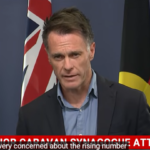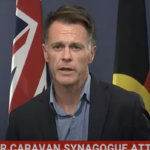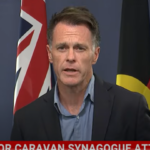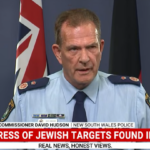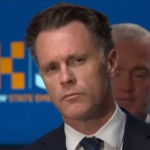Senior Labor Staffers Shed No Light at Caravan Inquiry, Because They Didn’t Take Notes
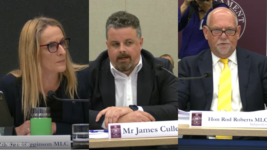
Senior staff from the offices of NSW premier Chris Minns and state police minister Yasmine Catley, who were present during NSW police briefings about the caravan located on a Dural property on 19 January 2025, finally turned up to testify at the NSW Legislative Council inquiry into the explosives-laden caravan on Friday, 27 June 2025, after legitimately being threatened with arrest if they didn’t.
The staffers had initially been called upon to testify before the inquiry in May but had refused. The upper house inquiry chaired by Independent MLC Rod Roberts then issued summonses requiring them to attend, under the provisions of the Parliamentary Evidence Act 1901 (NSW), on 17 June 2025.
But despite this law potentially leading to arrest and detainment if the summons was not adhered to, all seniors staffer pulled a no-show at a scheduled 20 June hearing, and rather provided written notice the night prior that they wouldn’t be attending, because they didn’t think the law quite applied to them.
The reason the upper house inquiry was launched was that after the public became aware of the caravan containing explosives and a note targeting Jewish premises, via a leak on 29 January, Minns told reporters there was “only one way of calling it out and that is terrorism”, and on riding this wave of fear, NSW Labor then jammed through three bills containing rights-eroding laws in response.
As for the senior staffers – three from the premier’s office and two related to the police minister – the MLCs wouldn’t be chasing them, via threat of arrest, if Minns and Catley appeared at the inquiry.
But the Labor ministers are exercising their power to refuse to appear before such inquires, and as Minns told 2GB Radio on 17 June, he answers more questions than most other pollies, so why should he be answering anymore.
The staffers appeared before The Relationship between the Dural Caravan Incident and the Passage of Relevant Bills through the Legislative Council inquiry on 27 June, and they were obviously miffed at having to be there, as their job is “not to be the face of things”.
Yet, as revealed, they couldn’t recall much anyway, because no notes were taken during the controversial police briefings.
“Only one way of calling it out”
On 29 January, when the news of the caravan became public and Minns was suggesting it was potentially a “mass casualty event”, NSW deputy police commissioner David Hudson revealed the doubts he and likely other officers shared about the legitimacy of the caravan incident because it’s obvious nature suggested a “setup” to make it look like the Jewish community was being threatened.
Hudson appeared before the inquiry on 7 April and told committee members that at his “briefings, which were limited, with the premier” he had expressed his “suspicion over the motivation behind” the Dural caravan incident “from very early on”.
The question remains whether “very early on” was prior to the premier’s suggestion to the public that there was “only one way of calling it out”, as well as whether the information was divulged before the passing of the three pieces of legislation containing hate speech laws and antiprotest measures that occurred over 20 and 21 February.
But when NSW Greens MLC Sue Higginson quizzed the NSW premier’s chief of staff James Cullen, as to when he became aware that the caravan full of explosives “was not an act of terrorism or vile antisemitism”, he answered that he knew there were “alternative lines of inquiry” “early on”, but as to the understanding it was definitely a fraud that came from the AFP on 21 February.
“The AFP source was discredited on 21 February,” Cullen said, and added that was when NSW police was informed it could not press terrorism charges. He also suggested that the NSW police minister’s chief of staff Ross Neilson had told him. “The next step,” he added, was “the press conference with the AFP and NSW police on 10 March”, which was when it was revealed to be a staged crime.
And in response to a further question from Libertarian MLC John Ruddick, Cullen said that the link between the three bills that were passed, and the Dural caravan was “extremely unfortunate and unfair”, as they’d been in the drafting for a long time and had nothing to do with “alleged terrorism offences”, but rather were all about “community harmony and antisemitism”.
Laws long in the drafting
The Dural caravan was not the only so-called antisemitic incident over the last summer. There were numerous graffiti and arson attacks on Jewish premises and vehicles that commenced in late October 2024 and ended early in February.
The AFP revealed on 10 March that all the major incidents that grabbed headlines were also perpetrated by organised crime in order to negotiate with police over reducing a prison sentence. And Hudson confirmed to the inquiry in April that 14 incidents made up the staged “antisemitic crimewave”.
Ruddick put it to Cullen that the entire series of events motivated the passing of the three bills, but the staffer then outlined that the discussions around “race hate laws” had taken place “over a long period of time”, but he did concede that the caravan and the other staged crimes did hurry up the passage of the laws.
The Libertarian MLC further pointed out to Cullen that as soon as the AFP outlined the crimewave was a setup, the attacks had ended. He then asked the staffer whether he thought that was due to the exposure or the new laws the Minns government rushed through in response, and when Cullen suggested the laws had resulted in a “chilling effect”, Ruddick added that he thought that “fanciful”.
Pens-down meetings
Nationals MLC Wes Fang then confirmed with Cullen that he was present during a NSW police briefing of the NSW premier on 23 February. The upper house member then pointed out that it had been established earlier that this briefing had been a pens-down meeting, but he questioned why during a meeting about “a potential terrorism episode… no notes were kept by the premier’s office”.
Fang pointed to section 12 of the State Records Act 1988 (NSW), which stipulates that “each public office must make and keep full and accurate records of the activities of the office” and that “each public office must establish and maintain a records management program for the public”.
Cullen retorted that the briefing was not a “decision-making meeting”, and it was just an opportunity for the NSW police to directly fill in the NSW premier on how the investigation was going and there was no need for note taking.
But Liberal MLC Susan Carter outlined that the Minister’s Office Handbook requires notes to be taken as “other employees may need access to the information, now or in the future”, and she questioned why at a “briefing about a matter as important as a suspected terrorist event”, no one considered “that information was not going to need to be accessed now or in the future by other people”.
And when Fang went on to ask Cullen who decided upon the pens-down meeting, the chief staffer said, “I don’t recall a conversation between any of the parties to the briefing that we wouldn’t take notes”, and he further put it down to “instinctual awareness about the significance of this particular subject matter”, as it involved “the seriousness of a terrorism investigation”.
So, after four scheduled hearings into the Dural caravan, the public is no clearer on whether the NSW premier told the press that the incident had to be terrorism on 29 January, while he was privy to the doubts held by senior NSW police, and nor is the constituency any closer to understanding whether the rights-eroding laws passed in its wake, were knowingly rammed through based on a hoax.


